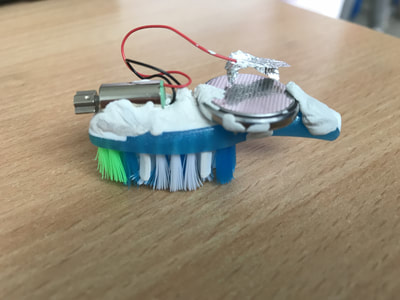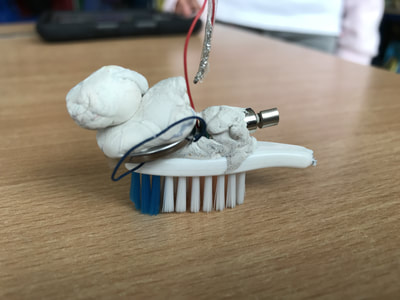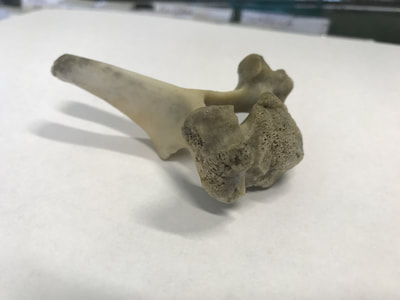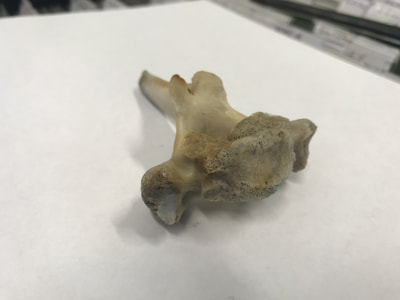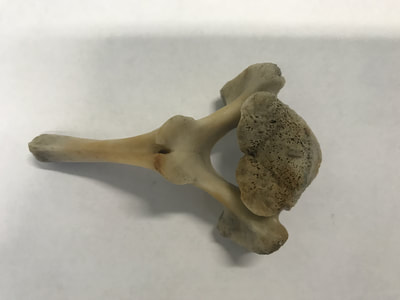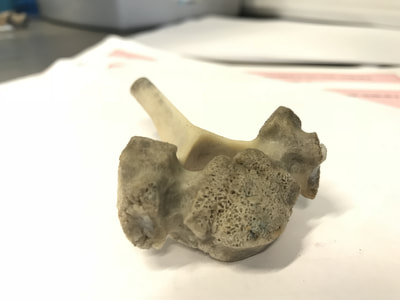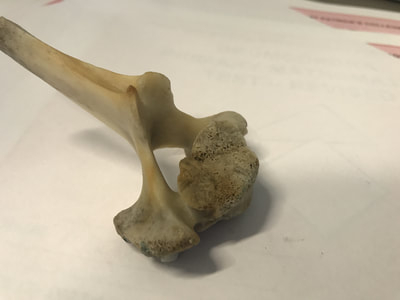Bristle Bots
This week we had great fun making Bristle Bots using small motors, batteries, toothbrushes and a whole lot of imagination. Then we had a great Bristle Bot Battle with the last one standing belonging to Arina. Well done Arina. :)
4A Bristle Bots from Cormac Cahill on Vimeo.
Funny bones
Norah found this unusual bone on the beach last week. She is going to email the Irish Whale and Dolphin Group to find out what it might be. Keep checking back to see what it is.
The School Garden
The school has a lovely garden created by the children of CETNS. We set up a wildlife camera to see what kind of animals or birds are around when all of the children have gone home. We got this lovely footage of a curious fox investigating our camera.
A Curious Fox from Cormac Cahill on Vimeo.
The Human Body
For the next week or two we are looking at the Human Body. We are beginning by looking at the internal organs. It's good to get the icky stuff out of the way first. Our plan is to create a digital book about the body. Most of the research is being done in class but for anyone that would like to do a little more research at home you can start by logging on to the Scoilnet website and accessing the World Book Online from there. I would suggest using the kids section rather than the student section. The links below should also help. These are all available on the Scoilnet website.
Garden Birds
This week we are looking at the birds that we tend to see most around our gardens. Some of you may be lucky enough to see all of them and some will only get to see one or two regularly. To help you identify them I have added some documents with some interesting facts and some images to help you identify your garden visitors.
| the_blackbird.pdf | |
| File Size: | 105 kb |
| File Type: | |
| the_blue_tit.pdf | |
| File Size: | 88 kb |
| File Type: | |
| the_chaffinch.pdf | |
| File Size: | 62 kb |
| File Type: | |
| the_coal_tit.pdf | |
| File Size: | 83 kb |
| File Type: | |
| the_goldfinch.pdf | |
| File Size: | 86 kb |
| File Type: | |
| the_great_tit.pdf | |
| File Size: | 84 kb |
| File Type: | |
| the_greenfinch.pdf | |
| File Size: | 98 kb |
| File Type: | |
| the_magpie.pdf | |
| File Size: | 86 kb |
| File Type: | |
| the_robin.pdf | |
| File Size: | 83 kb |
| File Type: | |
| the_sparrow.pdf | |
| File Size: | 99 kb |
| File Type: | |
Matchbox Cars
Matchbox Cars-4th Class A from Cormac Cahill on Vimeo.
Science Fair Videos
Science Week 2017 isn’t over yet but the past 2 days have been amazing. Well done to everyone in 4th Class A on yet another amazing event. I was blown away by the experiments I saw and I think it’s safe to say so was everyone else in the school. So to relive the past few days here are two videos of both Science Fairs. I’ll post some pictures in the coming days.
As we have done for the past few years we will be celebrating Science Week 2017 with another Science Fair. The children have all been given notes on what is expected over the coming weeks. Any help parents can give would be wonderful but please make sure that it is the kids work that is shown on the day (and not mammy and daddy's).
In case the notes go missing here it is for you to access whenever you need it.
Science Fair Project
Your project is to design an experiment for our science fair. You will be displaying your projects in the classroom for other students to observe so be sure to put forth your best effort!
Your project must follow the scientific method outlined below: This will be the written component of your project that visitors will read as they pass by your exhibit. You can piece this information together on a large poster page.
Be sure to save everything that you used for your project. You will be setting it up as part of your display for the day of the fair.
Science Fair Project Ideas (or create your own title)
Science Fair will take place during Science Week
(14-20 November 2016).
All projects must be submitted on or before Monday 14th November 2016.
Some Useful Websites:
http://www.education.com
http://www.sciencebuddies.org
http://www.sciencefair-projects.org/
Best of luck. :)
In case the notes go missing here it is for you to access whenever you need it.
Science Fair Project
Your project is to design an experiment for our science fair. You will be displaying your projects in the classroom for other students to observe so be sure to put forth your best effort!
Your project must follow the scientific method outlined below: This will be the written component of your project that visitors will read as they pass by your exhibit. You can piece this information together on a large poster page.
- Title (Be creative!)
- Question: What is the problem you need to solve? What are you trying to find out?
- Hypothesis: This is where you state what you think the answer to your question will be. This is an educated guess.
- Materials: List all the supplies you will need to carry out your experiment.
- Procedure: List step-by-step instructions describing how you will perform your experiment.
- Results: Record your observations and list everything that happened during the experiment. You will also need some type of visual display such as a chart, table, graph, photographs, etc. to organize your data.
- Conclusion: The answer (if you found one) to your original question. In your conclusion, explain your results.
Be sure to save everything that you used for your project. You will be setting it up as part of your display for the day of the fair.
Science Fair Project Ideas (or create your own title)
- How do different types of music affect pulse?
- Show a group of different pictures for one minute to males and females and see which gender can recall the most pictures.
- Take 5 different samples of Madeira cake. Color each sample a different color with food coloring. Have people guess what flavor they are eating to see if the appearance of cake affects its taste.
- Which brand of dish detergent lasts the longest?
- On which food does fungus grow best?
- Which laundry detergent works best on stains?
- Which brand of cereal gets soggiest in milk most quickly?
- Do new tennis balls bounce higher than old ones?
- Can the color of roof tiles affect the temperature inside? (Use different colored tiles and boxes to simulate a house)
- Does the weight of a pendulum have an effect on its speed? (use washers to change weight)
- Will an iron nail rust faster with or without bacteria? (sterilize one nail…place in jars of water)
- Which vegetables make the best dye? (Boil in a cup of water and see their effect on cloth)
- Does the design of a bridge affect the amount of weight it can hold? (make 3 bridges out of toothpicks and hang weights from each)
- Does the amount of pressure in a balloon affect its propulsion? (blow balloons up with different amounts of air, put a straw on a string and tape the string to the wall and measure)
- Draw the evolution of an animal over time.
- Does temperature affect how mold grows?
- Research a health topic.
- Can aspirin prolong the life of cut flowers?
- What is the effect of music on learning?
- What is the effect of light on mood?
- How do vocal warm ups affect how long you can hold a note?
- How does the brand of crayon affect the time it takes to melt?
- Will laundry detergent affect plant growth?
- Does Miracle Grow affect the way a plant grows?
- How does salt affect how fast ice will melt in a cup of water?
- How do different styles of ramps affect how far a toy car will travel?
- How does the tail affect the flight of a kite?
- How are rainbows formed?
- Make a homemade pinhole camera.
- Construct a homemade periscope and use it to explain light reflection.
- Does salt water affect buoyancy?
- How does temperature affect the growth of crystals?
- Which wrapping would keep sliced apples the longest in a refrigerator—foil, wax paper, plastic wrap or bags?
- Does salt affect the boiling point of water?
- Demonstrate how a simple machine works.
- Which paper airplane will fly the farthest?
- Compare the strength of different brands of paper towels.
- What are the effects of gravity on seed sprouting?
- Does seed size affect germination rates?
- How much weight can a group of balloons lift?
- What materials are the best insulators?
- How does surface area affect the evaporation rate of liquid?
- Children can work individually, in pairs or in groups of 3.
- Experiments need to be undertaken at home with the supervision and help of parents.
- Children will be given a little time in school over the final two weeks to develop the written part of the project.
- Teachers will provide children with large display poster paper.
Science Fair will take place during Science Week
(14-20 November 2016).
All projects must be submitted on or before Monday 14th November 2016.
Some Useful Websites:
http://www.education.com
http://www.sciencebuddies.org
http://www.sciencefair-projects.org/
Best of luck. :)
